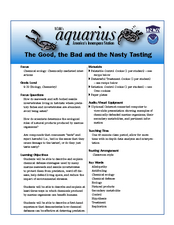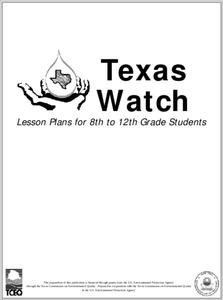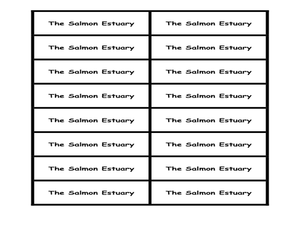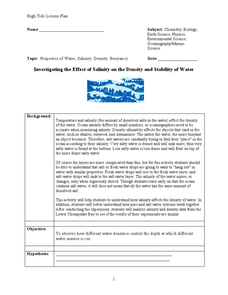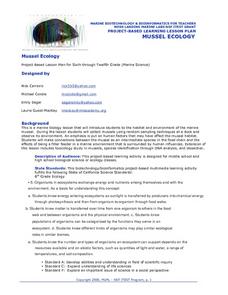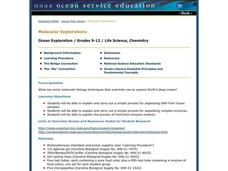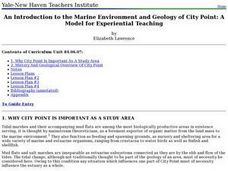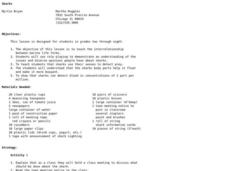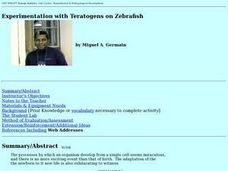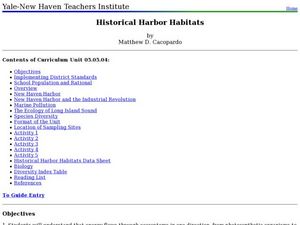Curated OER
Let's go to the Video Tape!
Using actual data from a deep-sea video survey, high school marine biologists consider the biodiversity, compare species richness between two communities, and learn to calculate the diversity index. The lesson plan is all-inclusive,...
Curated OER
Bioluminescence 2009: Living Light on the Deep Sea Floor Expedition - Now You See Me, Now You Don't
Young scholars examine bioluminescence and camouflage of deep sea creatures. In this deep sea creatures lesson, students investigate the visible and near-visible light spectrum. They work in small groups to complete a light, color, and...
Curated OER
The Good, the Bad and the Nasty Tasting
Students examine the effect of chemicals from marine plants or animals on predator's preferences. In this ecology instructional activity, students conduct taste tests and collect necessary data. They write their conclusion after...
Curated OER
Water Quality Sampling
Students explore the water qualities in Texas. They evaluate the water quality of six different samples by observing and smelling them. They present a list of the cups that contained good water quality based on their observations. They...
Curated OER
The Salmon Estuary And Human Impacts
Learners have discussions and complete activities about the pacific salmon life cycle and marine parasites. In this salmon lesson plan, students complete activities such as observing sea lice, playing a tag game, and a board game.
Curated OER
Watch the Screen!
Students explore screening processes for biological activity. In this deep sea lesson students complete a lab activity.
Curated OER
Algae Experiments
Students describe the characteristics of algae. In this biology lesson, students perform a series of experiment to explore algae. They investigate the basic things algae need to survive.
Curated OER
Effects of Water Pollution on Aquatic Organisms
Students investigate water pollution. They develop an understanding of the behavior of organisms, of the structure and properties of matter, and of natural and human induced hazards by conducting lab tests. They present their data...
Curated OER
Investigating the Effect of Salinity on the Density and Stability of Water
Water with varying amounts of dissolved salt are dyed and then used to compare densities. The objective is to discover the effect of salinity, and therefore density, on ocean water on the stability of the ocean. Many branches of science...
Curated OER
Mussel Ecology
Students are introduced to the marine environment of the mussel. The emphasis of the lesson is upon what human factors are present to influence the environment in positive and negative ways. They brainstorm in groups in order to conduct...
Curated OER
9th Grade
Ninth graders discuss the principal source of energy entering the marine ecosystem. They name some of the autotrophs at the Maui Ocean Center. Students name some of the heterotrophs at Maui Ocean Center. They are taught that plants are...
Curated OER
Molecular Explorations
Pupils explain the processes for separating DNA from tissue and separating complex mixtures. In this exploratory lesson students complete a lab where they extract DNA.
Curated OER
An Introduction to the Marine Environment and Geology of City Point: A Model for Experiential Teaching
Students begin the lesson by researching the history of City Point, Connecticut. Using a map, they color areas they were asked to find and discuss why the areas are important to the community. As a class, they are shown recent slides...
Curated OER
Bivalve Biology
Students place clams into a beaker containing saltwater. They place a small drop of food coloring just above the shell. Students observe the movement of the food coloring. Clams are then placed into clean beakers of saltwater with 24...
Curated OER
Collect Data Using a Transect Line
Young scholars learn about transect lines through a study of marine debris. In this marine debris lesson, students calculate the items on a transect line and graph them. Young scholars complete a category worksheet.
Curated OER
Kure Waste Chase Game Lesson
Students work together to identify marine debris. They explain the effect of the debris on various ecosystems. They draw different types of ocean currents as well.
Curated OER
Ancient Bugs
High schoolers describe Archaea. In this biology lesson, students examine biological communities and the role Archaea plays. High schoolers will compare and contrast the Archaea with bacteria and eukaryote.
Curated OER
Using Abiotic and Biotic Parameters to Monitor Air Quality
Students identify the abiotic factors that influence a river or stream and the organisms that live in it. They measure several abiotic and biotic parameters to gauge water quality. Students examine the biotic environment by identifying...
Curated OER
A Piece of Cake
Students examine life under the sea to discover coral gardens and microhabitats. They demonstrate learning by creating an edible marine ecosystem with a sheet cake, icing, and different candies.
Curated OER
Sharks
Students delve into a study of sharks. In this biology lesson plan, students explore how sharks use their senses to detect prey and understand that the sharks body parts help it float and make it more buoyant.
Curated OER
Analyzing Intertidal and Deep Sea Vent Communities
Students study how scientists measure diversity. In this diversity lesson students look at marine communities and look at data to calculate diversity in 3 different ways.
Curated OER
Experimentation with Teratogens on Zebrafish
Young scholars compare mitosis and meiosis with regard to chromosome number in parent cells versus daughter cells, types of cells produced, total number of cells produced, and the number of divisions. In groups, identify and...
Curated OER
Historical Harbor Habitats
Tenth graders create food web displays in the classroom. In this ecology instructional activity, 10th graders identify the different pollutants in the environment and their effect on organisms. They collect samples of sediments from the...
Curated OER
Leaving Home
Pupils explain the importance of larval dispersal and retention to populations. They collect data on organisms and examine it.




